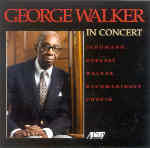George Walker’s composing voice is distinguished by superb craftsmanship and an open-hearted yet uncompromising style of neo-classicism. Pianists looking for well-built, audience-friendly works will find it well worth their while to program any of Walker’s four sonatas, or the highly effective Prelude and Caprice the composer plays here. Unlike many composer/pianists who chiefly play their own music, Walker’s recitals always have embraced the so-called “standard” repertoire’s full scope. I suspect the present recital, taped in December 2001, stems from carefully produced home recordings, due to the dry sonics and an instrument whose bass register lacks palpable resonance and impact.
The more pianistically demanding selections reveal that Walker’s once-formidable technique has eroded. Note, for instance, his cautious tempos for those lethal skips in the Schumann Fantasia’s first two movements; the unison passages where the hands are not 100 percent together (the Fantasia’s first movement, the coda of Chopin’s Fourth Ballade); or the “ghosted” notes that are implied rather than stated (Chopin’s C-sharp minor Etude Op. 10 No. 4). Similarly, Chopin’s A-flat Polonaise pales next to the powerful swagger Horowitz and Rubinstein could still bring to this warhorse in their respective old ages.
Easier pieces, however, give Walker no problems and allow him to convey valuable interpretive insights without having to give primary attention to the hands. His Debussy Preludes have impressive rhythmic backbone, while the Chopin E-flat minor Etude and F minor Mazurka bear a strong polyphonic profile. In lieu of power and forward sweep, Walker focuses on making the most of Schumann’s restless bass lines and frequently buried inner voices. And the Rachmaninov Prelude reveals that Walker still commands gorgeously even trills. In short, savor this uneven release’s memorable moments.
































